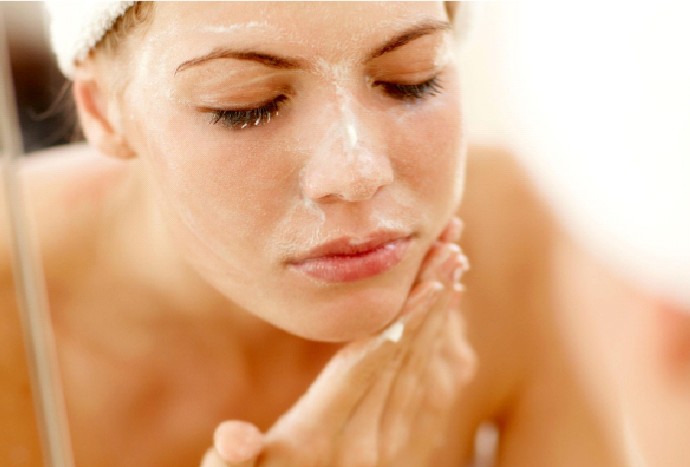Nothing can feel as satisfying as smooth, soft, and healthy skin. Since exfoliation helps us to achieve just that, it can be easy to fall into the temptation of going a bit overboard with it.
Since each one of us has different skin types, our skin needs also vary accordingly. This is precisely why there is no definite answer concerning the frequency of exfoliation. Thankfully, there are a couple of ways to help you determine the correct exfoliation method as well as how often should you exfoliate your face.
Why take the pain of exfoliating?

Our skin has five layers with the newest skin cells existing right at the very base. Over time, the outer layer tends to become tougher, creating a barrier that prevents things from coming in. This is important to protect the sensitive layers as well as to prevent any further moisture loss. The outmost layer eventually does get replaced by newer cells with time. What exfoliation does is that it helps to make the entire process even faster, all the while leaving you with brighter and healthier skin.
There are two types of exfoliators: physical and chemical. Physical exfoliators usually consist of face exfoliators like apricot scrub, sugar, or salt. There are also motorized brushes for this purpose. These types of exfoliators, as the name suggests, help to remove any dead skin cells from your face physically.
Chemical exfoliators employ the use of acids that helps to break the bonds between skin cells and the little bridges holding them together. The common exfoliating ingredients under this category include Alpha Hydroxy Acids (AHAs) and Beta Hydroxy Acids (BHAs).
Is there a concept of over-exfoliation?
When you start exfoliating your face way too much, it is known as over-exfoliation. Since you are removing dead skin cells from your face, going overboard will result in too much protective barrier loss. This will negatively affect your moisture retention capacity leaving you with dry skin that suffers from frequent blemishes and other skin issues.
The right way to exfoliation is to be aware of your skin tolerance level. A good rule of thumb is to stick to using exfoliators once or twice a week. But then again, if you feel that your skin can handle more exfoliation without acting up, you can develop a beauty routine for your skin around that as well.
You also like to point out that if you feel that your face is stinging with lots of redness, you are using a product that doesn’t suit you and needs to be immediately replaced. It would be more preferable to introduce a chemical exfoliator for your skin because they are usually far less intense. In fact, Alpha Hydroxy Acid peels can help to remove dead skin cells while promoting the production of collagen. This can give you a more youthful appearance as well. If you use these peels during the summers, don’t forget to apply sunscreen to increase the protection layer.
How to choose a good exfoliator?
The only way that you can find a good exfoliator is by focusing on the ingredients list. If you are opting for physical exfoliation, choose products that contain natural yet gentle ingredients such as jojoba beads, poppy seeds, and pumice.
If you are going for chemical exfoliation, salicylic acid, glycolic acid, and lactic acid can be great for your skin. There are also lesser-known acids like malic acid and mandelic acid that can be great for removing any prior clogging in your skin cells. You can avail of these acids by using plant enzymes like pomegranate, papaya, and pineapple.
Tips to help you achieve flake-free skin
Now that we have established the correct way to select an exfoliator and its frequency, here are a few tips to help you understand the other nuances a bit better.
- Always be gentle with your skin. Exfoliation doesn’t mean torturing your skin to make sure every sign of gunk or individual flake is cleared. You have to be careful with the entire process, whether you opt for physical exfoliation or chemical exfoliation.
- Take out time to listen to your skin. If your skin reacts adversely after getting in contact with a particular product, it will start showing the signs. If you feel that your skin is suddenly breaking out or developing patches, it is its way of telling you to change your product.
Also, it is not necessary for you to create a routine for exfoliation. For example, if you have previously exfoliated your skin on a Friday, it doesn’t naturally imply that you have to do the same on the next Friday. If your skin feels rough or looks dull, you can use an exfoliator before Friday as well. In the same way, if your skin doesn’t require any exfoliation until after Friday, you can adjust your routine accordingly. Being flexible is the key.
There is a misconception that sugar can be way too harsh on your skin when, in reality, it is actually one of the gentlest exfoliators. It is just areas that you have to take into consideration. If you feel dry around your chin, mouth, or eyelids, opting for a sugar scrub can be your best bet. Not only are they mild, but they also help to dissolve the dead skin gently without causing any irritation.
Takeaway thoughts
Exfoliation is a crucial part of every skincare regimen. It will help you achieve smooth and even skin while simultaneously removing dead skin cells, sebum, and oil. With the help of exfoliation, you will get healthy skin that looks shiny and healthy.
Having said this, you also need to understand the exfoliation needs of your skin. Scrubbing away most of your hard outer layer will irritate your skin that can lead to breakouts, excessive dryness, and peeling. You have to find the right balance here. After a bit of trial and error, you will be able to create a good exfoliation routine without any skin issues.








